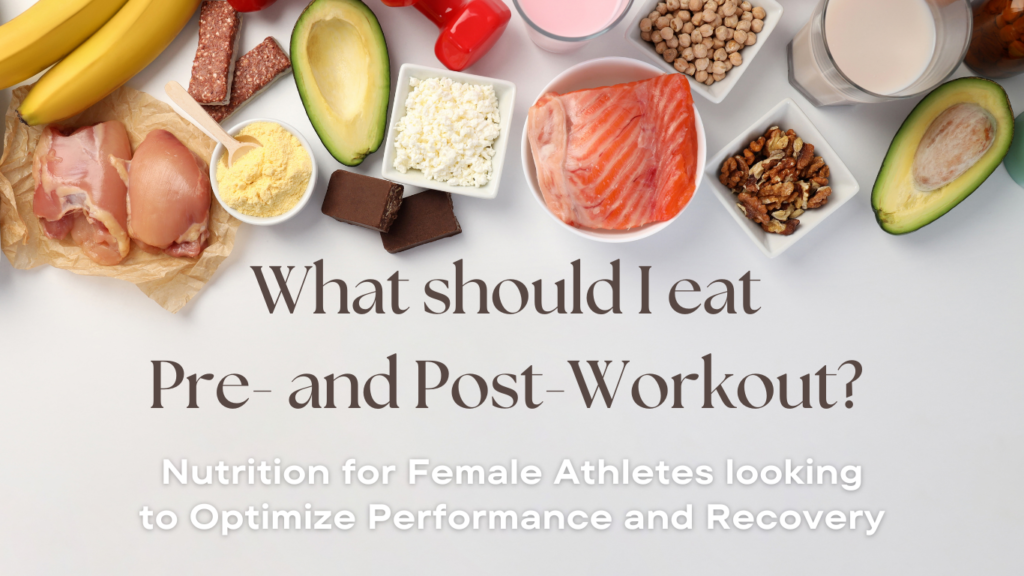
Introduction
Proper nutrition is crucial for athletic performance and recovery, particularly for female athletes. Dr. Stacy Sims’ research emphasizes the importance of tailored nutritional strategies to meet the unique needs of high school and college female athletes. This article will explore pre- and post-workout nutrition protocols for strength and cardio-based training, explaining the physiological benefits and providing practical meal ideas.
Understanding Nutritional Needs for Female Athletes
Female athletes have distinct nutritional needs compared to their male counterparts. Hormonal fluctuations throughout the menstrual cycle affect energy levels, metabolism, and nutrient requirements. Understanding these differences is essential for optimizing performance and recovery.
Macronutrients—proteins, carbohydrates, and fats—play specific roles in athletic performance. Protein supports muscle repair and growth, carbohydrates provide energy, and fats are vital for overall health. Balancing these macronutrients is key to meeting the energy demands of training and competition.
Pre-Workout Nutrition
Importance of Pre-Workout Nutrition
Fueling the body before exercise is essential for maintaining energy levels, preventing fatigue, and optimizing performance. Proper pre-workout nutrition ensures that athletes have the necessary nutrients to support their training sessions.
Pre-Workout Nutrition for Strength Training
- Recommended intake: 15g of protein
- Physiological impact: Consuming protein before strength training promotes muscle protein synthesis, aiding in muscle repair and growth.
- Suggested foods: Greek yogurt, protein shake, eggs
Pre-Workout Nutrition for Cardio-Based Training
- Recommended intake: 15g of protein + 30g of carbohydrates
- Physiological impact: Combining protein and carbohydrates provides energy, replenishes glycogen stores, and supports protein synthesis, enhancing endurance and performance.
- Suggested foods: Banana with nut butter, oatmeal with protein powder, smoothie with fruits and protein
Post-Workout Nutrition
Importance of Post-Workout Nutrition
Post-workout nutrition is crucial within 45 minutes after exercise to prevent the body from entering a low energy or catabolic state, which can lead to muscle breakdown. Proper nutrition during this window aids in muscle recovery, glycogen replenishment, and overall recovery.
Post-Workout Nutrition for Strength Training
- Recommended intake: 20-25g of protein + 30-40g of carbohydrates
- Physiological impact: Consuming protein and carbohydrates post-strength training enhances muscle protein synthesis and reduces muscle soreness.
- Suggested foods: Chicken and rice, protein shake with fruit, tofu stir-fry
Post-Workout Nutrition for Cardio-Based Training
- Recommended intake: 20-25g of protein + 40-50g of carbohydrates
- Physiological impact: Rapid glycogen replenishment and muscle repair are essential after cardio workouts to support recovery and maintain performance levels.
- Suggested foods: Quinoa salad with beans, smoothie with protein and oats, salmon with sweet potato
Physiological Explanations
- Role of Protein: Protein is essential for muscle repair and growth. It helps rebuild muscle fibers damaged during exercise, promoting muscle strength and size.
- Role of Carbohydrates: Carbohydrates replenish glycogen stores, the primary energy source during exercise. Adequate carbohydrate intake ensures sustained energy levels and prevents fatigue.
- Importance of Timely Nutrient Intake: Consuming nutrients within 45 minutes post-exercise prevents a catabolic state, where the body breaks down muscle for energy. This state can lead to loss of lean muscle mass, decreased performance, and longer recovery times.
Practical Tips and Recommendations
- Meal Planning and Preparation: Plan and prepare balanced meals to ensure you meet your nutritional needs. Incorporate a variety of protein and carbohydrate sources.
- Examples of Balanced Pre- and Post-Workout Meals:
- Pre-Strength Training: Greek yogurt with berries
- Pre-Cardio Training: Oatmeal with protein powder and banana
- Post-Strength Training: Chicken and rice with vegetables
- Post-Cardio Training: Smoothie with protein, oats, and fruit
- Hydration Strategies: Stay hydrated before, during, and after workouts. Drink water and consider electrolyte beverages for longer training sessions.
- Considerations for Vegetarian or Vegan Athletes: Plant-based athletes can meet their protein and carbohydrate needs with foods like tofu, beans, lentils, quinoa, and plant-based protein powders.
Grocery List for Meal Ideas
- Proteins: Greek yogurt, protein powder, eggs, chicken, tofu, beans, lentils, salmon
- Carbohydrates: Bananas, oatmeal, fruits, rice, quinoa, oats, sweet potatoes
- Vegetables: Leafy greens, mixed vegetables
- Additional Items: Nut butter, berries, electrolyte beverages
Conclusion
Proper pre- and post-workout nutrition is vital for female athletes to optimize performance and recovery. By following Dr. Stacy Sims’ guidelines and understanding the physiological benefits of targeted nutrition, athletes can enhance their training outcomes and overall well-being. Individualized nutrition plans and professional guidance can further support athletes in achieving their goals.
References
- Sims, S. T. (2016). ROAR: How to Match Your Food and Fitness to Your Unique Female Physiology for Optimum Performance, Great Health, and a Strong, Lean Body for Life. Rodale Books.
- Phillips, S. M., & Van Loon, L. J. C. (2011). Dietary protein for athletes: From requirements to optimum adaptation. Journal of Sports Sciences, 29(S1), S29-S38.
- Thomas, D. T., Erdman, K. A., & Burke, L. M. (2016). Position of the Academy of Nutrition and Dietetics, Dietitians of Canada, and the American College of Sports Medicine: Nutrition and Athletic Performance. Journal of the Academy of Nutrition and Dietetics, 116(3), 501-528.
- Beelen, M., Burke, L. M., Gibala, M. J., & Van Loon, L. J. C. (2010). Nutritional strategies to promote postexercise recovery. International Journal of Sport Nutrition and Exercise Metabolism, 20(6), 515-532.
- Ivy, J. L., & Portman, R. (2004). Nutrient Timing: The Future of Sports Nutrition. Basic Health Publications.
This article incorporates research and guidelines from Dr. Stacy Sims’ literature and other relevant studies to provide evidence-based recommendations for female athletes.

